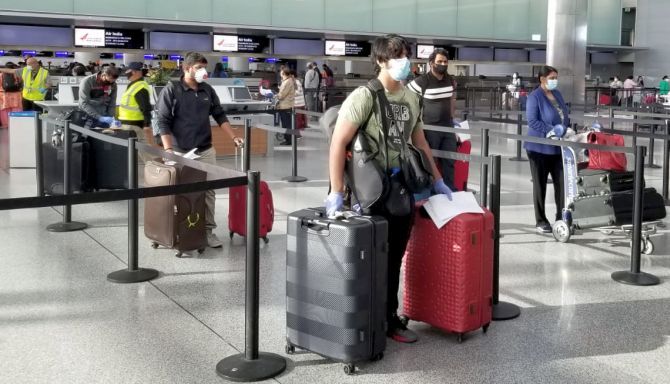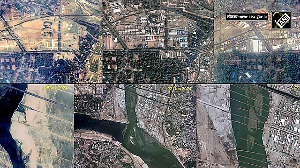United States President Joe Biden has imposed restrictions on travel from India that stops most non-American citizens from entering the US for an indefinite period from May 4, citing the surging COVID-19 pandemic in the country.

Biden issued a proclamation on Friday restricting travel from India starting on May 4.
Certain categories of students, academics, journalists and individuals have been exempted from the ban, the US State Department said.
US nationals, those having green cards, their non-citizen spouses and children below 21 years of age, are among the various categories exempted from the restrictions.
The new travel restrictions have been imposed for an indefinite period and will require another presidential proclamation to end it.
"I have determined that it is in the interests of the United States to take action to restrict and suspend the entry into the United States, as non-immigrants, of non-citizens of the United States who were physically present within the Republic of India during the 14-day period preceding their entry or attempted entry into the United States," says the proclamation signed by Biden on Friday.
The decision has been taken at the recommendation of the Centers for Disease Control and Prevention, within the Department of Health and Human Services, which determined India is experiencing widespread, person-to-person transmission of SARS-CoV-2, the virus that causes COVID-19.
“The World Health Organization has reported that the Republic of India has had more than 18,375,000 confirmed cases of COVID-19. The magnitude and scope of the COVID-19 pandemic in India surging,” Biden said, adding that India accounts for over one-third of new global cases.
The number of new cases in India is accelerating at a rapid rate, he said. Biden said there have been more than 300,000 average new daily cases in India over the past week.
After reviewing the public health situation within India, the CDC has concluded that proactive measures are required to protect the nation's public health from travellers entering the United States from that jurisdiction, he said.
“There is no question that it is a great tragedy, in terms of the loss of life, and as I have said before, and I will say again, we as a country have made a commitment to the people of India to support them,” Vice President Kamala Harris told reporters on Friday in Cincinnati, Ohio.
According to the State Department, the travel ban exemption to certain categories is in line with a similar exemption that the US has granted to some categories of travellers from Brazil, China, Iran and or South Africa.
“In keeping with the Department of State's commitment to facilitate legitimate travel to the United States, Secretary (Antony) Blinken decided today to apply the same set of National Interest Exceptions to India that he had previously applied to all other regional travel restrictions currently in effect as a result of the COVID-19 pandemic,” the State Department said.
Students seeking to commence studies in the fall, academics, journalists and individuals who provide critical infrastructure support in countries affected by a geographic COVID-19 restriction may qualify for the exception, it said.
This includes qualified applicants who have been present in India, Brazil, China, Iran, or South Africa, it added.
The pandemic continues to limit the number of visas our embassies and consulates abroad are able to process, it said.
As always, visa applicants should check the website of the nearest embassy or consulate for the most up-to-date information about visa appointment availability, the State Department said.
“As the global situation evolves, the Department continues to seek ways to process more visa applications, in line with science-based guidance from health authorities and with the health and safety of staff and applicants as our priority,” it said.
In a national interest exemption issued by the State Department on April 26, which it said is good for India too, students with valid F-1 and M-1 visas intending to begin or continue an academic programme commencing August 1 or later do not need to contact an embassy or consulate to seek an individual exemption to travel.
They may enter the United States no earlier than 30 days before the start of their academic studies.
Students seeking to apply for new F-1 or M-1 visas should check the status of visa services at the nearest embassy or consulate.
Those applicants who are found to be otherwise qualified for an F-1 or M-1 visa will automatically be considered for an NIE to travel, it said.
The Department of State also continues to grant NIEs for qualified travellers seeking to enter the US for purposes related to humanitarian travel, public health response and national security.
These travellers and any others who believe their travel to be in the United States' national interest should also review the website of the nearest US embassy or consulate for instruction on how to contact them, it said.
Meanwhile, the US embassy in New Delhi said: "We encourage US citizens who wish to depart India to take advantage of currently available commercial flights.
"Airlines continue to operate dozens of direct flights weekly from India to the United States. Additional flight options remain available via transfers in Paris, Frankfurt, and Doha," it said.
Meanwhile, Republican lawmakers criticised US President Biden for imposing restrictions on travel from India.
“Restricting travel to our ally India while leaving our border open to Mexico is not rational,” Congressman Tim Burchett said in a tweet, soon after the White House announced Biden's decision.
Another Republican lawmaker Jodey Arrington also criticised Biden for this proclamation on travel.
“Biden enacting an India travel ban while keeping the border open is like locking your front door, but leaving the back door wide open. I wonder if the Left will accuse him of being xenophobic and anti-Hindu,” Arrington asked.
“As Biden bans flights from India, perhaps he should be reminded of a tweet he put out last year. Also, I thought travel bans were xenophobic,” Congresswoman Lauren Boebert said in a tweet.
After former US president Donald Trump imposed a travel ban from Europe, Biden, who was the Democratic presidential candidate at that time, had opposed it.











 © 2025
© 2025